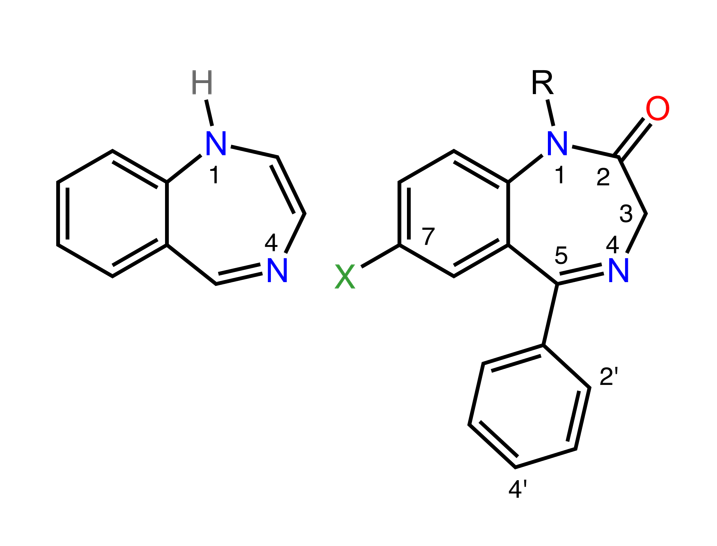Playlist
Show Playlist
Hide Playlist
Anxiolytics
-
Slides Anxiolytics Psychiatry.pdf
-
Download Lecture Overview
00:01 I want to review some of the highlights now of anxiolytic medication with you. 00:06 So common anxiolytics actually include now antidepressants, SSRIs are first line for the treatment of anxiety. 00:14 Other antidepressants can be useful as well, so that's important to note. 00:18 We’ll talk more in this lecture about benzodiazepines and then also hit upon the fact that that beta-blockers can be useful for anxiety and also antipsychotics at low doses can have some benefits. 00:31 So first line treatment again for anxiety is now actually the antidepressant class of medication. 00:37 This is great because these are non-addictive medications. 00:41 One drawback would be that antidepressants can take about four to six weeks before a patient gets full benefit from the medications. 00:49 So that’s something important to keep in mind especially if your patient is really struggling with anxiety in the acute phase. 00:56 Now, the mechanism of action of anxiolytics, specifically the benzodiazepines, is that they really work by depressing the central nervous system. 01:07 So therefore, although they calm people down, they have that CNS depressant effect that causes pretty extreme sedation and even disinhibition. 01:18 So benzodiazepines though nonetheless are amongst some of the most commonly prescribed medications in the U.S. 01:26 And some of the indications here for benzodiazepines include the anxiety disorders, also muscle spasms, seizures, sleep disorder, alcohol withdrawal and also they’re used in anesthesia. 01:40 So let met touch a little bit more on the alcohol withdrawal point. 01:43 So alcohol, very similar to benzodiazepines, depresses the central nervous system. 01:49 So when a patient’s withdrawing from alcohol, all of a sudden their brain regions are lighting up and this makes them susceptible to having a seizure and therefore, the treatment and detox is actually to administer benzodiazepine to help calm down their brain regions. 02:06 Now, because the benzodiazepines cause CNS depression, we tend to try to use them for short term use only or in acute treatment phase Okay, they’re highly addictive substances otherwise known as controlled substances, something important to keep in mind. 02:24 So they’re actually not first line anxiolytics anymore. 02:27 Now, we know the antidepressant are, but benzodiazepines are still sometimes used in the treatment of anxiety and actually pretty commonly used. 02:35 Some advantages of the benzodiazepine is that when they’re used appropriately, they’re fairly safe. 02:42 However, they do have this high addiction potential and also can cause disinhibition. 02:47 It’s really important because they’re so sedating, that people not drive when they’re using these medications. 02:53 Now, the duration of use of the benzodiazepine is going to be variable. 02:59 Say if somebody’s withdrawing from alcohol, you’re going to use it very short term during their detox phase. 03:06 Let’s say you have a patient who has maybe a social anxiety disorder or an obsessive compulsive disorder and they just get extremely anxious off the charts to the point where they’re panicking. 03:20 Well, maybe you start that patient on an SSRI, but because it can take a month or longer for that SSRI to really start working, you might, depending on the patient profile and their tolerance and whether or not they have any addiction history, but you might consider giving them a short term benzodiazepine. 03:38 And again, this is working by potentiating GABA receptors. 03:43 So there are both long and intermediate acting benzodiazepines. 03:47 So you can see of the examples of them here. 03:49 Longer acting ones like diazepam and chlordiazepoxide will have pretty long half life and therefore they can be used for a variety of different things. 04:01 The intermediate acting or shorting acting benzodiazepines include lorazepam and alprazolam. 04:08 These really work instantaneously for the patient who’s really having a panic attack. 04:13 Now, the side effects again are really important to note for benzodiazepines. 04:18 There’s drowsiness, impairment of intellectual functioning and reduced motor control. 04:23 So people should not be driving or operating important equipment or machinery while taking these medicines. 04:31 There can be respiratory depression and overdose, which is a real caution in prescribing a benzodiazepine to any patient who might be prone to suicide. 04:40 So I want to emphasize again the ever importance of doing a safety and suicide risk assessment in psychiatry. 04:48 And especially when a benzodiazepine is combined with alcohol, it’s just amplifying the effects of both, it’s activating GABA, which is an inhibitory neurochemical. 05:01 It’s causing severe CNS depression and therefore the risk of a respiratory depression is going to be even greater. 05:08 Again, another medication or sometimes recreational substance that can be used are opiates and we know this huge opiate crisis happening right now. 05:18 So a patient who’s taking a benzodiazepine, drinking alcohol and using an opiate is going to be at very significant risk for respiratory depression. 05:27 This is why it’s really important to know your patient well and get a detailed history before prescribing any medication. 05:35 Now, I want to take a moment to shift gears a little bit and talk about zolpidem, which isn’t exactly a benzodiazepine, but it’s used for the treatment of insomnia and often in patients who have insomnia because of anxiety. 05:48 Now, this can actually selectively bind to the GABA receptor and it doesn’t have any anticonvulsant or muscle relaxant properties. 05:58 It really doesn’t have a withdrawal problem, but it can be used for the treatment of insomnia. 06:04 A couple of things to note about the use of zolpidem are that, well, it can actually cause some side effects like sleepwalking. 06:14 It can cause night terrors and it can actually cause memory loss. 06:18 So that’s an important note and for that reason, we really try to use it in a limited use. 06:23 And for women especially, we try to use very, very low doses because it does have a right risk of memory and cognitive problems associated with it. 06:32 Now, another medication that can be useful in the treatment of anxiety is buspirone. 06:37 Now, this medication is a great alternative to an antidepressant or benzodiazepine. 06:43 It can treat generalized anxiety disorder It has a slower onset of action than the benzodiazepine but it does work a bit quicker than the antidepressants. 06:52 So this one, it has anxiolytic action at the serotonin receptor where it actually is a partial agonist. 06:59 So that’s how it’s a bit different from the antidepressants, which really antagonize serotonin receptors. 07:05 So this doesn’t potentiate CNS depression and it also has low potential for abuse or addictions, making it a good alternative. 07:14 Now another medication that can be used for anxiety is a beta blocker, something like propranolol. 07:20 Beta-blockers can treat the autonomic effects of panic attacks and performance anxiety. 07:26 It helps to alleviate palpitations, sweating and tachycardia. 07:30 So it can also be used to treat akithisia, that’s sometimes seen as a side effect of antipsychotic medication. 07:37 Now, one important side effect to note with propranolol is that it actually is known to cause depression. 07:43 So you want to be a little bit careful when using it in somebody prone to having depression. 07:48 And I want to make a final note here just to highlight to you the fact that antipsychotic medications can actually be used for anxiety. 07:56 So in very low doses, medications such as quetiapine can be used to treat different anxiety disorders. 08:02 Of course, you want to be careful with these medicines and monitor really closely for side effects. 08:07 That’s a quick highlight and review of the anxiolytic medications and you should know that while benzodiazepines are commonly prescribed, there are other options, too, and certainly medications that are less addictive.
About the Lecture
The lecture Anxiolytics by Helen Farrell, MD is from the course Anxiety and Stress-Related Disorders. It contains the following chapters:
- Anxiolytics
- Benzodiazepines
- Zolpidem
Included Quiz Questions
Which one of the following drugs is the first line of management for anxiety?
- Selective serotonin reuptake inhibitors (SSRIs)
- Benzodiazepines
- Zolpidem
- Beta-blockers
- Buspirone
Which amongst the following statements about anxiolytics is FALSE?
- Antipsychotics have anxiolytic effects at very high doses.
- Anxiolytics/hypnotics work diffusely in the brain causing a sedative effect.
- Benzodiazepines are the most commonly prescribed agents.
- Antidepressants take 4–6 weeks to express their effects.
- Anxiolytics are also used for managing alcohol withdrawal symptoms.
Which of the following intermediate-acting benzodiazepines are used for treating alcohol withdrawal?
- Lorazepam
- Alprazolam
- Temazepam
- Diazepam
- Chlordiazepoxide
Which of the following is NOT a side effect of benzodiazepines?
- Muscle rigidity
- Reduced motor coordination
- Impairment in intellectual function
- Drowsiness
- Respiratory depression
Zolpidem (Ambien) is used in limited doses in women because of which of the following side effects?
- Memory problems
- Weight gain
- Respiratory depression
- Rebound insomnia
- No tolerance or dependence
Which of the following psychiatric conditions can be caused by propranolol?
- Depression
- Anxiety
- Bipolar type 2
- Seizure disorder
- Previous cardiovascular diseases
Which of the following receptors are targeted by buspirone to achieve its anxiolytic effect?
- 5-HT-1A
- Dopamine
- GABA
- ACH
- Glutamate
Customer reviews
5,0 of 5 stars
| 5 Stars |
|
3 |
| 4 Stars |
|
0 |
| 3 Stars |
|
0 |
| 2 Stars |
|
0 |
| 1 Star |
|
0 |
This video provides a wonderful breakdown of the pros and cons of different treatment options, I especially enjoyed the explanation of different types of benzos. Thank you!
All her lectures are superb. The presentation methodology is excellent. It is clear, focused and very professional. I wish to continuously listen to the lectures. In nutshell the lectures are fabulous.
1 customer review without text
1 user review without text




